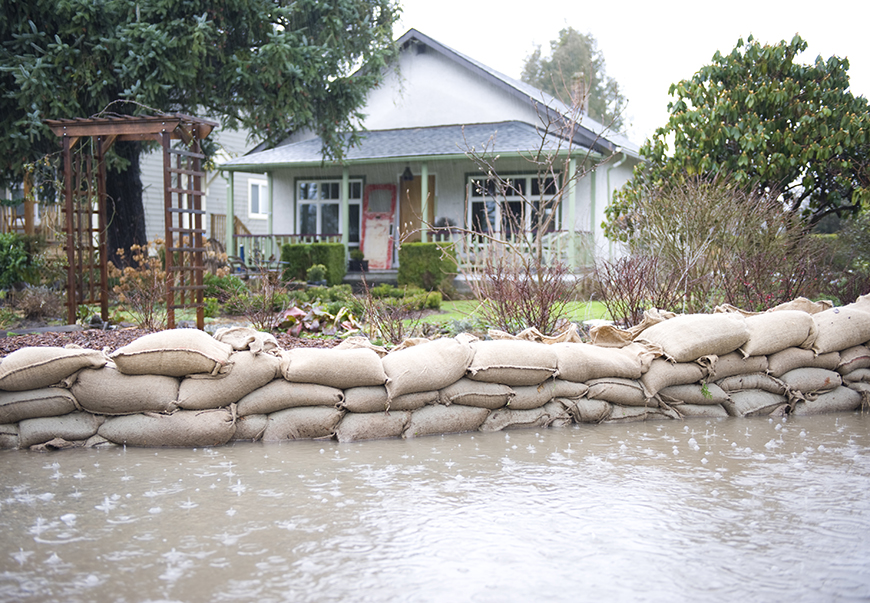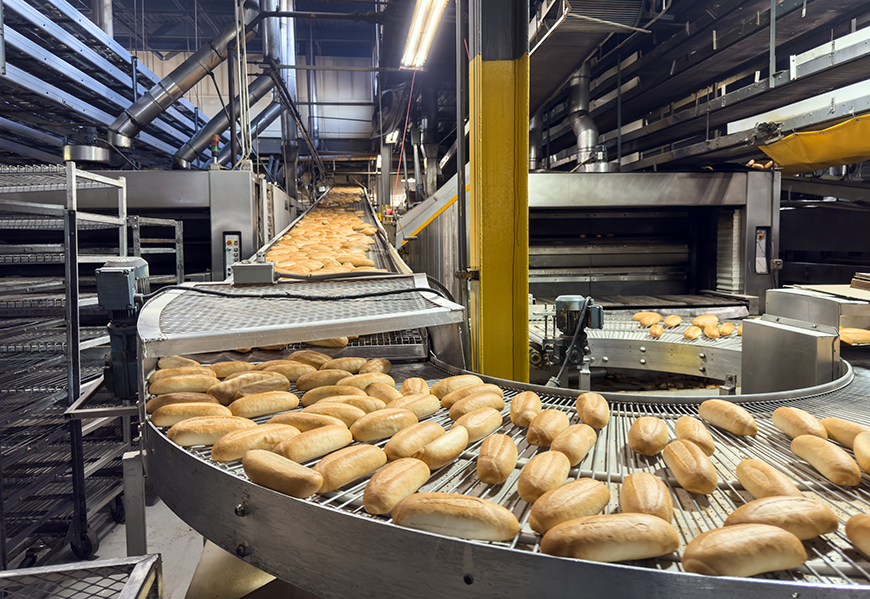
Down in the Valley
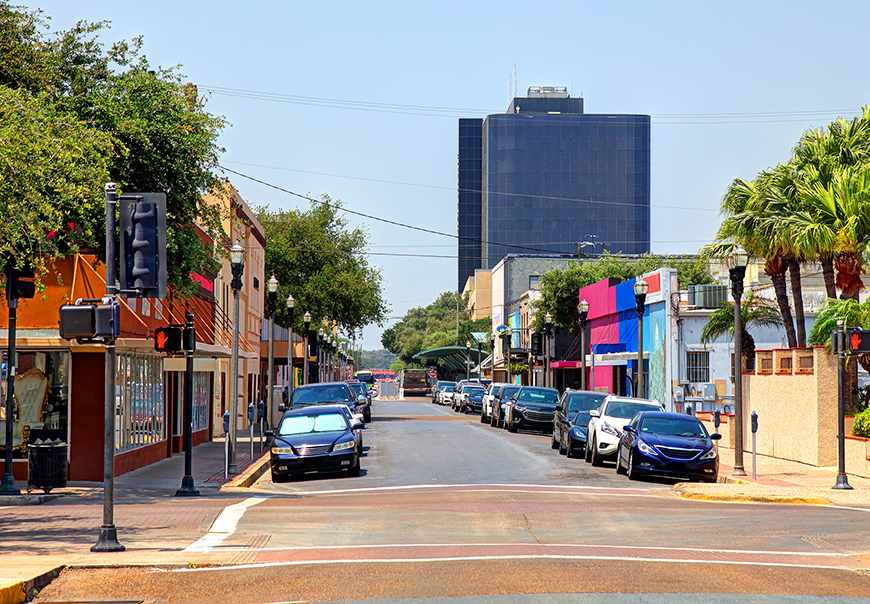
McAllen-Edinburg-Mission’s economy was flourishing until the onset of COVID-19. The pandemic impacted some of the area’s major economic drivers, such as healthcare, cross-border trading, and winter Texans. The extent of the damage is still unknown. |
The Texas economy ended the last decade on a high note with a record-setting economy, including low unemployment and sustained overall job growth. Remarkably, those gains extended beyond the largest Texas metros to others, including McAllen-Edinburg-Mission. Then COVID-19 hit, throwing the economy into a tailspin.
McAllen Housing Market: Great . . . Until it Wasn’t
Between 2012 and 2019, home sales growth in the McAllen-Edinburg-Mission Metropolitan Statistical Area (MSA) was generally positive with only a couple of flat years in 2016 and 2018. Over the same period, aggregate home prices also grew but at a steadier year-over-year rate. The mean price increased from $128,000 in 2012 to $168,000 by year-end 2019. Repeat-sales analysis reveals a similar price-growth pattern beginning as early as 2013 (Figure 1).

Home supply at the end of 2019 was at a historic low at approximately six months of inventory. Homes were on the market an average of 85 days.
The first two months of 2020 were on pace to deliver positive first quarter year-over-year sale gains (Figure 2). That changed in late March as Texas gradually shut down, choking off numerous sectors of the economy. Real estate was no exception, and month-end March sales essentially plateaued compared with the same period the year before.
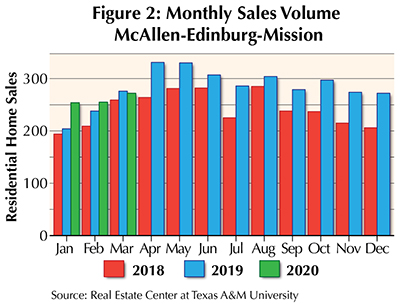
March 2020 data spelled potentially troubling news for eventual sales volume going into the second quarter, the start of the MSA’s prime real estate selling season. Month-end new listings were below those from 2019, and the count of active listings converting into pending sales remained essentially the same. Both of these metrics tend to ramp up around that time of year. The map shows where and by how much April 2020 home sales changed from a year ago in the MSA.
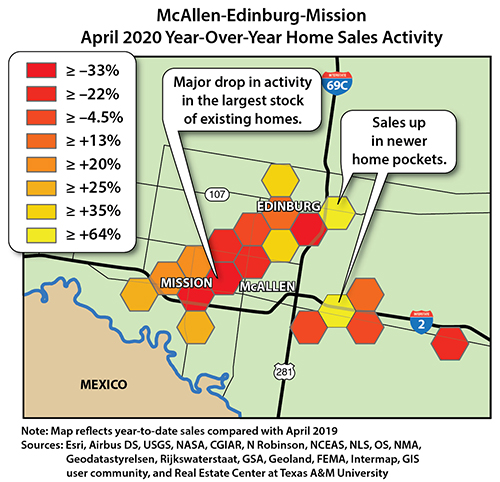
The MSA’s economic and housing outlook will remain uncertain until the coronavirus threat is under control. Once that happens, economic recovery will depend heavily on the area’s core industries bouncing back.
Industries to Watch
McAllen-Edinburg-Mission’s healthcare industry is a major employer. Much of the area’s overall job growth over the past 20 years is in large part due to healthcare.
As it did with many other industries, shelter-in-place orders disrupted Texas’ healthcare industry. While demand was expected to be high for some emergency services in preparation of the pandemic peak, many nonessential medical services such as routine checkups and elective procedures were either postponed or canceled. As a result, many medical workers faced either a job furlough or termination.
The same is likely true for McAllen-Edinburg-Mission healthcare workers, though the magnitude may differ. This is due to the composition of healthcare workers in the local healthcare labor pool, which is unique compared with the rest of the state and nation. According to detailed employment data from the Bureau of Labor Statistics’ Quarterly Census of Employment and Wages (QCEW), much of the MSA’s healthcare workforce consists of home health practitioners. In recent years, these workers have accounted for approximately a tenth of total jobs in the area as well as for much growth over the past 20 years (Figure 3).

How the coronavirus pandemic will impact home healthcare is uncertain, as employment trends in this sector aren’t always in step with the overall healthcare industry. For example, a sudden employment dip in 2013 hit home health workers but not the overall healthcare sector. This is possibly due to specific changes imposed by the Affordable Care Act, such as Medicare reimbursement rates.
Cross-border trade with Mexico will be another industry to watch. This industry provides a stable employment backbone for McAllen-Edinburg-Mission. Job growth over the past 20 years hasn’t been as impressive in this sector as it has been in healthcare, but, prior to the pandemic, the new United States-Mexico-Canada Agreement (USMCA) provided favorable growth prospects for Texas border towns, including McAllen-Edinburg-Mission.
For the MSA and its cross-border neighbor, Reynosa, the new trade agreement could open the door for more automobile-related manufacturing opportunities. Reynosa provides a variety of manufactured goods, including automobile parts. Those expectations may be put on hold as new agreement compliance milestones and, more than likely, consumer demand both lag due to the coronavirus. Automobile sales declined for two years before hitting bottom during the Great Recession due to diminished global demand.
Flight of the Snowbirds
While many industries have been hurt by the pandemic, the service industry was among the most impacted. This includes hospitality, restaurants, and retail.
Many of these services exhibit seasonal highs and lows, such as summer travel or winter holiday shopping. McAllen-Edinburg-Mission has an additional seasonal cycle due to annual tourism from “snowbirds," also known as winter Texans. The MSA has a long tradition of attracting visitors from northern states and even Canada seeking to escape harsh winter temperatures for the Rio Grande Valley’s more moderate climate. These visitors have a significant economic impact on numerous local service businesses.
Fortunately, the coronavirus hit toward the end of the snowbird peak season, which starts as early as November and ends in March. Historically, between January and March local hotel room revenues increase, RV park employment elevates, and state parks reach their highest attendance. Compare that with many other Texas tourism spots where peak business picks up in the summer. Additionally, pedestrian border-crossings into Mexico from nearby Progreso, a major destination for Texans seeking inexpensive medical services and prescription drugs, are also at their highest.
Snowbirds don’t influence home sales seasonally the same way they do the service industry. Given the brief snowbird season, this demographic may be more likely to rent short term than buy long term. However, their annual economic boost is still undeniable. The big question is, will they return next year?
Cloudy Economic Forecast
Just as economic cycles come and go, so do crises. How long will it take for McAllen-Edinburg-Mission to return to some semblance of normalcy? How much economic disruption will come of all this? Pasts crises might provide some clues.
For example, the global economic crisis in the 2000s dramatically altered residential real estate and set the stage for the next generation of housing issues. This included new-home construction shortages and eventual problems with housing affordability.
At this point, not enough dust has settled to determine the final impact of the coronavirus, but it’s safe to say that it will leave a lasting mark, if not on McAllen-Edinburg-Mission’s housing market, then at least on the lives of its residents.
____________________
Roberson ([email protected]) is a senior data analyst with the Real Estate Center at Texas A&M University.
You might also like

Publications
Receive our economic and housing reports and newsletters for free.
